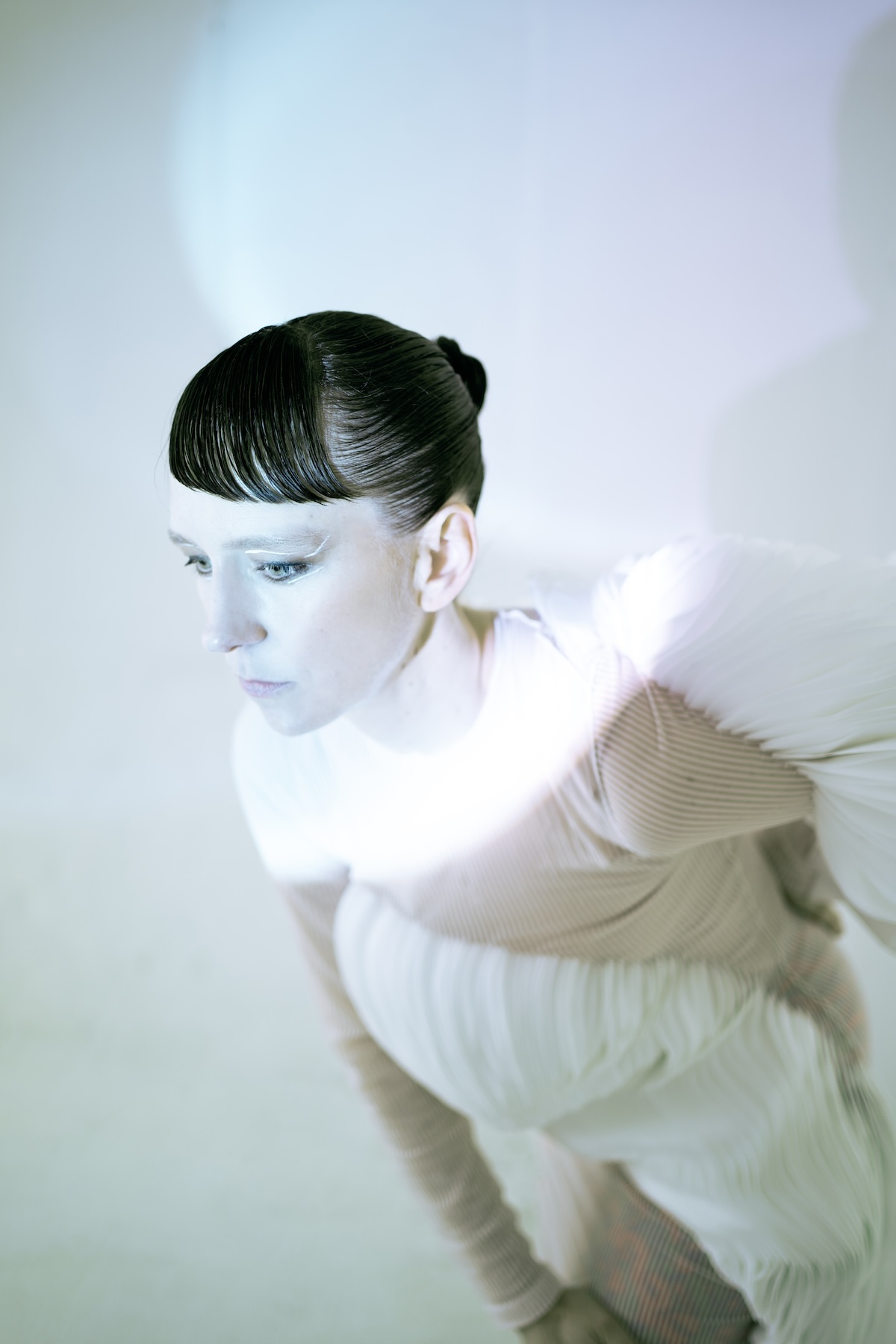Johanna Elina Sulkunen
«The voice has been/is the core all the way through.»

Johanna Elina Sulkunen es una vocalista, compositora e improvisadora experimental finlandesa que vive en Copenhague. Su trabajo abarca distintas formas de arte, como son la música, con la entrega de cinco larga duración: “Our Garden” (estrenado como Johanna Elina en 2011); “Belonging” (2016); “Koan” (2018), bajo el nombre de Sonority I; el álbum “Terra” como Sonority II, (2021) y “Coexistence” que se lanzará el próximo 24 de Mayo en Tila Rec.
Sus orígenes vienen del jazz, de hecho es licenciada en canto de jazz por la Academia de Jazz de Rotterdam, convirtiéndose así en una voz destacada de la escena del jazz alternativo. Con sus colaboraciones con otros músicos, ha ampliado los géneros musicales, desde jazz y pop hasta improvisación libre, música electrónica y vanguardia.
Se graduó de la línea de posgrado “Solista” (interpretación) en el Conservatorio de Música Rítmica de Copenhague en 2017 y tiene también una maestría en Antropología/Religión Comparada de la Universidad de Helsinki.
Forma parte del galardonado grupo vocal IKI fundado en 2009 por cinco vocalistas de Noruega, Finlandia y Dinamarca. Todas ellas trabajan con la voz como un instrumento más e improvisan, utilizando dispositivos electrónicos para manipular y entregar nuevos matices en lo vocal. También Sulkunen ha trabajado con artistas visuales y en producciones teatrales con bailarines, poesía y cine. Se ha presentado en importantes escenarios de Europa y Japón.
La columna vertebral del trabajo de Johanna Elina Sulkunen es la combinación de su voz con la electrónica que se plasma con fuerza en su nuevo disco “Coexistence” publicado en Tila Rec. Después de un trabajo de seis años, “Coexistence” completa la trilogía que inició con su proyecto Sonority I y el disco “Koan” (2018) y luego Sonority II con “Terra” (2021).
En los pasajes ambientales en “Coexistence” emerge la voz onírica de Sulkunen, junto a grabaciones de campo que capturan distintas voces marginadas como son las de refugiados y personas sin hogar, con las que conversó nuestra protagonista, a partir de una pregunta abierta: “¿Qué dirías si todo el mundo estuviera escuchando?”
El enfoque experimental de Sulkunen con la electrónica que comprende el procesamiento de su voz, produciendo ecos, distorsiones y sonidos abstractos, son la banda sonora para las complejidades e inequidades del mundo en el que vivimos.
Agradezco a Maria Nannou de la Agencia de publicidad, gestión y consultoría, Modern Matters por gestionar esta entrevista y a Johanna Elina Sulkunen por compartir su proyecto artístico.
En relación a tu pregunta: “¿Podemos, escuchando, aprender a pensar de manera diferente?” Me parece que la respuesta es sí, ya que a medida que empatizamos con los demás, podemos escucharlos mucho mejor y de esta manera nuestra forma de pensar o entender cambia. ¿Cuál es tu opinión sobre la mencionada pregunta?
“En la vida cotidiana, es fácil vivir sin prestar tanta atención a los sonidos que te rodean. Pero si realmente empezamos a escuchar, se abre una nueva dimensión. A menudo nos olvidamos de escuchar a los demás y de sentir empatía por ellos, pero también nos olvidamos de escuchar la vida que nos rodea y a nosotros mismos. Pequeños sonidos y grandes sonidos, el ambiente y la vida que nos rodea, tanto las personas como el entorno. Todos compartimos el mismo mundo sonoro y es igual para todos (excepto para aquellos con discapacidad auditiva). Pero nos hace a todos iguales sin importar dónde o quiénes seamos en nuestro estatus social, género o cualquier cosa que aparentemente pueda separarnos. Y eso nos hace a todos parte de la misma vida compartida”.
¿Cómo profundizaste/mejoraste tu escucha?
“Creo que en este proyecto, de muchas maneras, escuchando y conversando con varias personas de diferentes orígenes. Y antes, por supuesto, de escuchar mucha música, meditar y practicar canto”.
¿Cómo fue tu experiencia en cuanto a las conversaciones y entrevistas con personas socialmente marginadas?
“La gente no está socialmente marginada o convencional por defecto, porque creo que es sólo una cuestión de coincidencia o de circunstancias en las que las personas nacen, son arrojadas o terminan en sus vidas. Todo el mundo puede quedar ‘marginado socialmente’. También cada voz cuenta. Todo el mundo tiene algo que decir y en el proceso de entrevistar y conversar, surgieron algunos temas en común que respaldan la noción de que todos somos muy similares aunque vivamos en diferentes circunstancias. Escuché muchas historias y opiniones y desearía que todas las voces pudieran ser escuchadas por igual. Creo que de esa manera nuestras sociedades serían mucho más saludables para todos.
Por lo que las conversaciones han sido interesantes, a veces reveladoras, a veces muy conmovedoras y emotivas otras, muy informales al conversar sobre cosas cotidianas”.
¿Cómo empezó tu interés en componer tu propia música?
“Creo que siempre he ‘compuesto’ de alguna manera. Fue más bien empezar a ser consciente de ello e interesarme cada vez más en los procesos compositivos. Para mí es natural pero a veces también muy desafiante, como cualquier proceso artístico”.
Con “Coexistence” se completa la trilogía que inició con tu proyecto Sonority I y el disco “Koan” (2018) y luego Sonority II con “Terra” (2021). ¿Qué descubriste con esta trilogía?
“Comencé el proyecto hace 6 años por lo que ha sido un viaje. La vida evoluciona en muchas capas mientras vivimos, por lo que yo también he cambiado y crecido personalmente con ella. En la trilogía, la voz ha sido / es el núcleo en todo momento. La voz y su resonancia en el cuerpo y el lenguaje, la voz y su resonancia en relación con la naturaleza que nos rodea y la voz en relación con la sociedad. Hay una gran variedad de temas que es difícil reducir a una trilogía.
Creo que el descubrimiento más profundo fue que existe una inmensa variedad de fenómenos en el mundo que aún tengo que descubrir a través de la música. Por eso siento que estoy apenas en el comienzo”.
¿Combinas tu música con otras formas de arte?
«Sí. Trabajo en estrecha colaboración con un artista visual (Tapani Toivanen) que diseñó todas las portadas de los álbumes de Sonority y creó conceptos visuales en torno a ellas. También he trabajado en producciones teatrales con bailarines, poesía y cine”.
¿Qué papel juegan las grabaciones de campo en tu música?
“Han sido el núcleo del nuevo álbum. Creé todas las piezas a partir de grabaciones de campo, historias y sentimientos trasladados a piezas musicales. El proceso ha sido muy intuitivo, pero a veces también ha sido difícil navegarlo y decidir el formato final.
Este viaje ha estado lejos de la producción de un álbum tradicional e incluye muchas formas interdisciplinarias como documental, investigación antropológica, una instalación y álbumes musicales. También se publicará un folleto con la grabación de partes de las entrevistas transcritas para abrir aún más el proceso”.
¿Qué destacarías como miembro del conjunto vocal experimental IKI?
“Que la música no se trata de grandes egos y cultos a las estrellas, sino que la creación musical colectiva puede elevar todo a otro nivel. Realmente se trata de hacer música, no tiene que ver con los individuos”.
Cuéntanos por favor sobre tus próximos proyectos.
“Trabajaré en una residencia con un grupo de trabajo, transfiriendo el material y la temática del álbum a una instalación en vivo y al mismo tiempo realizaré algunos conciertos en solitario en relación con el lanzamiento del álbum. Haré una gira por Japón en octubre.
También tendré conciertos con el proyecto teatral como parte de IKI en otoño y en 2025. FLAMMENWERFER es el nuevo espectáculo de teatro musical del Hotel Pro Forma, creado por las directoras Kirsten Dehlholm y Marie Dahl, los compositores y músicos Blixa Bargeld y Nils Frahm, el artista y diseñador de moda Henrik Vibskov, el diseñador de iluminación Jesper Kongshaug, el diseñador de vídeo Magnus Pind y el diseñador de sonido Erik Medeiros. En el escenario están Blixa Bargeld y el galardonado conjunto vocal IKI formado por Johanna Sulkunen, Guro Tveitnes, Kamilla Kovacs, Randi Pontoppidan y Jullie Hjetland.
Formo parte de una interesante colaboración con una cineasta/artista interdisciplinaria, Catarina Neves Ricci. Una nueva colaboración a dúo con el artista electrónico danés, Bjørn Svin, en la que tengo muchas ganas de sumergirme. Tengo el lanzamiento de un álbum y gira con un gran grupo de jazz ‘Scandinavian Art Ensemble’ en 2025, donde grabamos con el legendario trompetista Tomasz Stańko, una colaboración a dúo con el intérprete japonés de koto Michiyo Yagi, con quien el verano pasado grabamos material para un álbum. ¡Se vienen muchas cosas maravillosas!”

Johanna Elina Sulkunen is a Finnish experimental vocalist, composer and improviser living in Copenhagen. Her work encompasses different art forms, such as music, with the delivery of five full-length albums: “Our Garden” (released as Johanna Elina in 2011); “Belonging” (2016); “Koan” (2018), under the name of Sonority I; “Terra” album as Sonority II, (2021), and “Coexistence” which will be released in May 24th on Tila Rec.
Her origins come from jazz, in fact she has a degree in jazz singing from the Rotterdam Jazz Academy, thus becoming a prominent voice in Denmark’s alternative jazz scene. Through her collaborations with other musicians, she has expanded musical genres, from jazz and pop to free improvisation, electronic music, and avant-garde.
She graduated from the “Soloist” (performance) postgraduate line at the Copenhagen Conservatory of Rhythmic Music in 2017, and has a Masters’s degree in Anthropology / Comparative Religion from the University of Helsinki.
She’s part of the award-winning vocal group IKI founded in 2009 by five vocalists from Norway, Finland and Denmark. All of them work with the voice as another instrument and improvise, using electronic devices to manipulate and deliver new vocal nuances. Sulkunen has also worked with visual artists, in theater productions with dancers, poetry and film. She has performed in renown festivals in Europe and concerts in Japan.
The backbone of Johanna Elina Sulkunen’s work is the combination of her voice with electronics that is strongly embodied in her new album “Coexistence” published on Tila Rec. After six years of work, “Coexistence” completes the trilogy that began with his project Sonority I with the album “Koan” (2018) and then Sonority II with “Terra” (2021).
In the ambient passages in “Coexistence” Sulkunen’s dreamlike voice emerges, along with field recordings that capture different marginalized voices such as those of refugees and homeless people with whom our protagonist spoke, starting from an open question: “What would you say if the whole world was listening?”
Sulkunen’s experimental approach to electronics that involves processing her voice, producing echoes, distortions and abstract sounds, is the soundtrack to the complexities and inequities of the world we live in.
My thanks Maria Nannou from the Advertising, Management and Consulting Agency, Modern Matters for arranging this interview and to Johanna Elina Sulkunen for sharing her artistic project.
In relation to the question: “Can we, by listening, learn to think differently?” It seems to me that the answer is yes, since as we empathize with others, we can listen to them much better and in this way our way of thinking or understanding changes. What is your opinion regarding the question quoted?
“In everyday life, it’s easy to live without paying so much attention to the sounds surrounding you. But if we really start to listen, it opens up a new dimension. We often forget to listen to and empathize with others, but we also forget to listen to the life around us and ourselves. Small sounds and big sounds, ambiance, and the life that surrounds us, both the people and the environment. We all share the same sonic world, and it is equal to everyone (except those with hearing impaired). But it makes us all equal no matter where or who we are in our social status, gender, or whatever might seemingly separate us. And that makes us all part of the same shared life.”
How did you deepen/improve your listening?
“I think in many ways, in this project listening and talking with various people from different backgrounds. Earlier of course also from listening to a lot of music, meditating and also singing practice.”
How was your experience regarding conversations and interviews with socially marginalized people?
“People aren’t by default socially marginalized or mainstream because I think it’s just a matter of coincidence or circumstances where people are born or thrown or ending up in their lives. Everybody can become ‘socially marginalized’. Also, every voice counts. Everybody has something to say, and in the process of interviewing and talking some common themes emerged supporting the notion that we are all very similar though in different circumstances we live in. I heard many stories and opinions and I wish all voices could be heard equally. I think our societies would be much more healthy for everybody that way.
So, conversations have been interesting, sometimes eye-opening, sometimes very touching and emotional, and sometimes very casual talking about everyday things.”
How did you become interested in composing your own music?
“I think I’ve always ‘composed’ in a way. It was more like starting to be aware of it and getting more and more interested in the compositional processes. It is natural to me but sometimes also really challenging, like any artistic process.”
With “Coexistence” the trilogy that began with your project Sonority I and the album “Koan” (2018) and then Sonority II with “Terra” (2021) is completed. What did you discover with this trilogy?
“I started the project 6 years ago, so it’s been a journey. Life evolves in many layers while we are living, so I have also changed and grown personally with it. In the trilogy, the voice has been / is the core all the way through. Voice and its resonance in the body and language, voice and its resonance in relation to our surrounding nature, and voice in relation to society. There is a very big array of subjects that is hard to narrow down to a trilogy.
I think the most profound discovery was that there exists an immense array of phenomena in the world that I have yet to discover through music. That’s why I feel I’m just in the beginning.”
Do you combine your music with other art forms?
“Yes, I do. I work in close cooperation with a visual artist (Tapani Toivanen) who’s designed all the Sonority album covers and created visual concepts around them. I have also worked in theater productions with dancers, poetry, and film.”
What role do field recordings play in your music?
“They have been the core of the new album. I created all the pieces from the field recordings, stories and feelings transferred to pieces of music. The process has been very intuitive, but also sometimes challenging to navigate and decide on the final format.
This journey has been far from a traditional album production, and it includes many interdisciplinary forms such as documentary, anthropological research, installation, and musical albums. There will also be released a booklet with the recording of parts of the transcribed interviews to open up the process even more.”
What would you highlight as a member of the experimental vocal ensemble IKI?
“That music is not about big egos and star cults, but that collective music-making can lift everything to another level. It’s really about making music, not about the individuals.”
Please tell us about your upcoming projects.
“I will work on a residency with a workgroup, transferring the album material and thematics into a live performance – installation while also playing some solo concerts in relation to the album release. I will tour Japan in October.
I will also have concerts with the theater project as part of IKI in the fall and in 2025. FLAMMENWERFER is Hotel Pro Forma’s new music theatre performance created by the directors Kirsten Dehlholm and Marie Dahl, composers, and musicians Blixa Bargeld and Nils Frahm, artist and fashion designer Henrik Vibskov, light designer Jesper Kongshaug, video designer Magnus Pind and sound designer Erik Medeiros. On stage are Blixa Bargeld and the award-winning vocal ensemble IKI consisting of Johanna Sulkunen, Guro Tveitnes, Kamilla Kovacs, Randi Pontoppidan and Jullie Hjetland.
Then I am part of an exciting collaboration with a filmmaker/ cross-disciplinary artist, Catarina Neves Ricci. A brand new duo collaboration with a Danish electronic artist, Bjørn Svin that I’m really looking forward to dive into. An album release and tour with a big jazz group ‘Scandinavian Art Ensemble’ in 2025, where we recorded with a legendary trumpeter Tomasz Stańko, a duo collaboration with the Japanese koto player Michiyo Yagi where we recorded material for an album last summer. So lots of great things coming up!”
https://www.facebook.com/johannaelina

